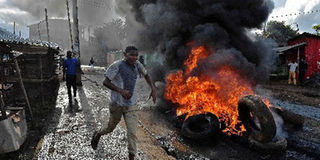Statesmanship needed to steer Kenya clear of turbulence

A protestor runs past a burning barricade in Kibera, Nairobi on May 23, 2016 during a demonstration by opposition supporters calling for disbandment of the Independent Electoral and Boundaries Commission. PHOTO | CARL DE SOUZA | AFP
What you need to know:
- It is clear that some judges are more interested and experienced in political intrigues than they are in making decisions that are in the public interest and in line with the spirit of the Constitution.
There is no doubt that Kenya is in deep turbulent waters and if the trends continue, we will be in a crisis of monumental proportion in little over a year. Already, most of our “independent” institutions—created to ensure that we never again slide into dictatorship and then inexorably to violence, chaos and decline—have either lost credibility, are in a state of turmoil, or have been captured by the Executive.
The shenanigans around the Supreme Court do not add to its credibility, and it is clear that some of the judges are more interested and experienced in political intrigues than they are in making decisions that are in the public interest and in line with the spirit of the Constitution.
The IEBC commissioners and senior staff seem to have no regard to the public interest, preferring to hang around as long as they can even when they know that their presence only hurts Kenya. I shudder to think about the 2017 General Election with a group of discredited and biased people in charge.
The less said about the anti-corruption commission that uses its powers to clear favoured people before investigations are fully done, the better. And now we need to keep an eye on the Kenya National Commission on Human Rights, where human rights deficient analysis have been made that seemed to come straight out of the playbook of State House propagandists.
Yet, we do not need to be here, and the optimist in me believes we can still calm these turbulent waters and avoid the dangers ahead. But that needs a massive dose of courage, statesmanship, and real patriotism--which is does not mean blind loyalty to a person, but to Kenya and its people who deserve real peace, truth and justice.
And the person with the biggest responsibility to provide that leadership, that courage, that statesmanship and patriotism is Mr Uhuru Kenyatta, for he controls the levers of power and whose decisions will take us either up or down. He took a good first step on Tuesday in inviting Cord leaders to lunch which reduced tensions palpably; sadly, he undid the calm the very next day with his Madaraka day pronouncements.
His role needs to be one that is magnanimous and in the public interest. The discomfort with the IEBC is not just about Cord. It includes all major sectors of the country from religious organisations to all political parties, but Jubilee. We have been through similar moments like this in 1997 and 2007. In 1997 Daniel Moi shifted ground and agreed to reform the then Election Commission of Kenya. But he did it so late in the process, thus ensuring that the ground had been set for the result he wanted. It is to avoid a similar fate that the cries to reform the IEBC started long ago, and any changes to the IEBC after August this year will likely not help reduce tensions.
There is also a responsibility on the police to obey the law and allow peaceful protests. We all saw the difference between Wednesday’s Uhuru Park rally and the “teargas Mondays” from previous weeks. In the vast majority of cases, it is police action, or inaction in failing to arrest (not beat up!) that leads to chaos, looting and violence. It is common wisdom the world over that when the police exercise restraint, do not intimidate and act cordially with protesters, the chances of violence, tension and chaos are dramatically reduced. And after Wednesday, we know they can do exactly that.
As for Cord, their obligation is to constantly call for peaceful protests, and if possible, provide marshals to watch out for agent provocateurs and thugs. But let’s be clear that under international law, and our constitution, we do not blame victims, or the powerless for exercising their rights.
Finally we should not confuse the “rule of law” with the “rule by law.” The former denotes a democratic society with a set of laws that caters to the public interest and human rights, good governance and transparency. The latter denotes a society—often fascist—where laws are created to control, intimidate and restrict freedoms in the service of the powerful.





